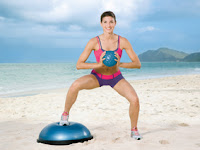How health-savvy are you?
Part Two - Multiple Choice...
The most dangerous place to gain weight is:
A. All over
B. Belly
C. Thighs
D. Hips
Answer: B. A bit more padding in your arms or legs may make your clothes snug, but it won't harm your health like a spare tire. New research from the Mayo Clinic has shown that lower-body fat is not biologically the same as a roll around the middle; that's largely made up of visceral fat, which has been linked to higher risk of diabetes, heart disease, and some cancers. But moderate aerobic exercise like walking can help reduce belly fat. Crunches, not so much.
To decrease your chances of catching a cold, avoid the following
A. Going outside with wet hair
B. Watching too much TV
C. Sleeping in a draft
Answer: B. Catching a chill, from an indoor draft or a blast of winter wind when your hair is wet - will not cause a cold. On the other hand, being a couch potato may increase your likelihood of catching one. A new study from Appalachian State University in North Carolina found the exercise reduces the frequency and severity of colds more than any other lifestyle factor. Participants in the study who exercised five times a week took 43% to 46% fewer sick days. And when they did get sick, their symptoms were much milder than their more sedentary peers'. Experts believe that exercise triggers immune cells to temporarily circulate, fighting infection.
Being able to touch your toes is a good way to test:
A. Your flexibility
B. Your Blood Pressure
C. Your risk of heart disease
D. Your muscle strength
Answer: A and C. Try this at home: Sit on the floor, legs straight, toes pointing up, and try to touch your toes. While an inability to reach your tootsies doesn't mean you're having a heart attack, new research indicates that lack of flexibility may mean that your arteries are as rigid as the rest of you. Stiff arteries can be precursor of heart disease. Researchers believe that stretching may not only keep your limbs more flexible but also slow down arterial stiffening.
Which of the following foods may reduce cavities?
A. Cranberries
B. Cereal
C. Bread
Answer: A. The antibacterial components in cranberry juice have already been shown to prevent urinary tract infections in women. Now it turns out that cranberries may also inhibit bacterial growth in your mouth, a leading cause of cavities and periodontal disease. (Beware of cranberry drinks with added sugar, thought. They only defeat the purpose.) Another bonus? One cup of cranberries has just 51 calories and is loaded with vitamin C.
The best source of more energy in the afternoon is:
A. A cup a green tea
B. A walk around the block
C. A nap
Answer: C. Researchers at the University of Surrey in England found that older people who have trouble sleeping at night are often reluctant to take naps because they worry it's a sign of laziness. In fact, the opposite is true. Participants who took the occasional nap when necessary had the energy to lead more active lives than their siesta-resistant peers.
What amount of sleep a night is linked to an increased risk of premature death?
A. 5.5 hours
B. 6.5 hours
C. 9 hours
Answer: A and C. Both too little and too much sleep have been linked to an increased risk of premature death, though for different reasons. According to a new meta-analysis of over one million participants, sleeping less than six hours a night increased the risk by 12%, while sleeping more than nine hours increased it by 30%. Researchers believe that sleeping too little actually causes the increased risk, while sleeping too much is probably an indication of an underlying health issue.
How much screen time per day will hurt kids' social and intellectual development?
A. 45 minutes
B. 2 hours
C. 3.5 hours
Answer: C. The American Academy of Pediatrics recommends that preschoolers limit screen time (including TV, computer and video games) to two hours a day. But a recent study found that over 66% of young children exceed that mark, which can lead to speech delays and obesity. In a study of tweens, a daily dose of over two hours of screen time was linked to increased psychological problems, including difficulty getting along with friends.
Which item is likely to be germiest?
A. Kitchen sponge
B. Bathtub drain
C. Remote control
D. Toilet seat
Answer: A. Beware the kitchen, especially sponges which soak up bacteria from food and counter tops. The solution: Moisten them, then pop them in the microwave for two minutes. While you're at it, five the remote a swipe with disinfectant. They're a magnet for germs, particularly during cold season.
The best place to store vitamins is in your:
A. Refrigerator
B. Linen closet
C. Medicine cabinet
Answer: B. The high humidity in the bathroom can cause vitamins to lose their potency. Refrigerators, often the second choice for storage, can also cause them to degrade faster because of temperature changes resulting from the door constantly being opened. Top preserve efficacy, stash your vitamins in a cool place away from sunlight and humidity - and out of reach of children.
To help pass up that second piece of chocolate cake, you should:
A. Vow to get on the scale the next morning
B. Remind yourself that it won't look good on your hips
C. Make a fist
D. Keep a bag of carrots and other healthy snacks handy
Answer: C. For an instant hit of willpower, clench your fist. A new study published in the Journal of Consumer Research found that tightening your muscles when faced with temptation can help shore up your self-control. One caveat: It only works in the moment - meaning, while you're actually staring down that slice.
Until Monday - keep thinking veggies and protein!

















